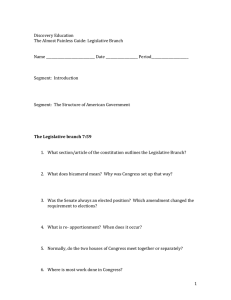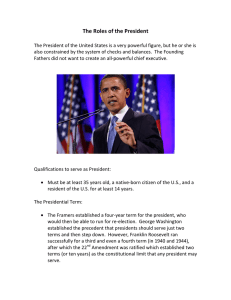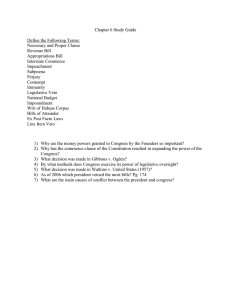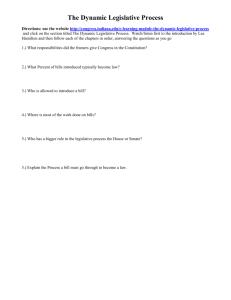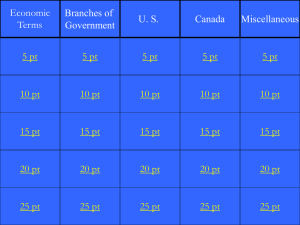Political Science 338 Instructor: Dr. James Ingram Telephone: 619-594-3776
advertisement
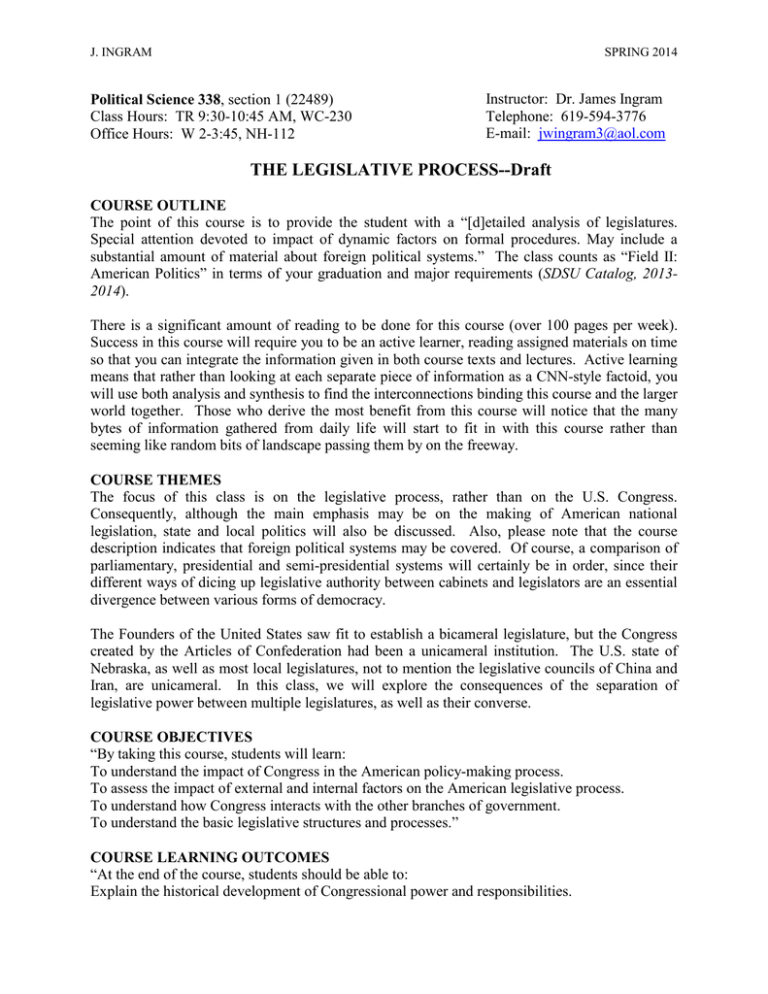
J. INGRAM SPRING 2014 Political Science 338, section 1 (22489) Class Hours: TR 9:30-10:45 AM, WC-230 Office Hours: W 2-3:45, NH-112 Instructor: Dr. James Ingram Telephone: 619-594-3776 E-mail: jwingram3@aol.com THE LEGISLATIVE PROCESS--Draft COURSE OUTLINE The point of this course is to provide the student with a “[d]etailed analysis of legislatures. Special attention devoted to impact of dynamic factors on formal procedures. May include a substantial amount of material about foreign political systems.” The class counts as “Field II: American Politics” in terms of your graduation and major requirements (SDSU Catalog, 20132014). There is a significant amount of reading to be done for this course (over 100 pages per week). Success in this course will require you to be an active learner, reading assigned materials on time so that you can integrate the information given in both course texts and lectures. Active learning means that rather than looking at each separate piece of information as a CNN-style factoid, you will use both analysis and synthesis to find the interconnections binding this course and the larger world together. Those who derive the most benefit from this course will notice that the many bytes of information gathered from daily life will start to fit in with this course rather than seeming like random bits of landscape passing them by on the freeway. COURSE THEMES The focus of this class is on the legislative process, rather than on the U.S. Congress. Consequently, although the main emphasis may be on the making of American national legislation, state and local politics will also be discussed. Also, please note that the course description indicates that foreign political systems may be covered. Of course, a comparison of parliamentary, presidential and semi-presidential systems will certainly be in order, since their different ways of dicing up legislative authority between cabinets and legislators are an essential divergence between various forms of democracy. The Founders of the United States saw fit to establish a bicameral legislature, but the Congress created by the Articles of Confederation had been a unicameral institution. The U.S. state of Nebraska, as well as most local legislatures, not to mention the legislative councils of China and Iran, are unicameral. In this class, we will explore the consequences of the separation of legislative power between multiple legislatures, as well as their converse. COURSE OBJECTIVES “By taking this course, students will learn: To understand the impact of Congress in the American policy-making process. To assess the impact of external and internal factors on the American legislative process. To understand how Congress interacts with the other branches of government. To understand the basic legislative structures and processes.” COURSE LEARNING OUTCOMES “At the end of the course, students should be able to: Explain the historical development of Congressional power and responsibilities. J. INGRAM PAGE 2 SPRING 2014 Explain the system of elections for members of Congress. Describe the essential Congressional structures-Committees and subcommittees: - Leadership; - Norms of behavior; Explain the basic legislative process (how a bill becomes a law); - Budgetary process. Explain outside influences on Congress: -Interest groups; -Parties; - Other branches of government (executive, judiciary, bureaucracy). Describe why Congress is often reactive rather than proactive.” [The above section is quoted from the below URL, accessed on May 23, 2012: http://www.ccis.edu/syllabi/syllabus_master.asp?PREFIX=POSC&COURSENUM=350.] COURSE REQUIREMENTS Your course grade will be based on 3 examinations and a term paper. Each examination will consist of at least 50 multiple-choice questions and a written exam. I will post study guides for both components prior to these exams. Your term paper will be on a topic related to the course, and should be approved by the instructor via an email, which you will attach as an appendix to your paper. I will post instructions on the term paper weeks before it is due. The term paper essay must be submitted through Turnitin to ensure that students avoid academic dishonesty. “Students agree that by taking this course all required papers may be subject to submission for textual similarity review to Turnitin for the detection of plagiarism. All submitted papers will be included as source documents in the Turnitin reference database solely for the purpose of detecting plagiarism of such papers. You may submit your papers in such a way that no identifying information about you is included. Another option is that you may request, in writing, that your papers not be submitted to Turnitin. However, if you choose this option you will be required to provide documentation to substantiate that the papers are your original work and do not include any plagiarized material.” There is no extra credit or participation credit for this class. I do require that you observe proper classroom etiquette. If you are going to surf the net on your computer, please sit in the back row of class so as not to disturb others. There are to be no private conversations during class time. I only ask that if you must leave a class before a lecture is over, you do it quietly and unobtrusively so that you do not disturb the learning of your fellow students. There will be no extra credit assignments to substitute for poorly done or missed coursework, so don’t ask. You are permitted to study with others to prepare for exams, and you may talk with other students about your essay assignment, but your exams and essay are not a collective performance. Group work during the exams and submission of substantially identical essays may serve as evidence of academic dishonesty and will be grounds for immediate failure, and appropriate disciplinary action by SDSU administrators. As per university policy, I do want to make it clear that it is NOT acceptable to turn in work that you have drafted in a previous or concurrent class to satisfy your essay requirements for this class. For the purpose of this course, that is academic dishonesty. J. INGRAM PAGE 3 SPRING 2014 COURSE DEADLINES AND GRADE CALCULATION COMPONENT DATE PORTION OF COURSE First Midterm TBA 25% Second Midterm TBA 25% Term Paper TBA 25% Final Exam May 15 25% Course Grade N/A 100% REQUIRED READINGS 1. Jacobson, Gary C., The Politics of Congressional Elections, 8th Ed. 2. Black, Amy, From Inspiration to Legislation: How an Idea Becomes a Bill. 3. Additional materials I will place on Blackboard and MyPoliSciLab for the class. SCHEDULE OF LECTURES AND READING ASSIGNMENTS January 23 Introduction to the Course and Instructor. January 28 The Constitutional Context. Please read U.S. Constitution pre-class. January 30 Parliamentary vs. Presidential Systems. Begin Jacobson. February 4 Bicameralism and Federal systems compared. Continue Jacobson. February 6 The Electoral Imperative. Continue Jacobson. February 11 Congress and Home Style. Continue Jacobson; read Fenno online. February 13 Campaigning and Elections. Continue Jacobson. February 18 The Case of the Vanishing Marginals. Continue Jacobson. February 20 Structure and Process; Finish Jacobson. February 25 TBA February 27 TBA March 4 FIRST MIDTERM EXAMINATION March 6 How Congress Works, or Doesn’t. Begin Black. March 11 Legislative Leviathan. Continue Black. March 13 Unorthodox Lawmaking. Continue Black. March 18 Committees versus the Parties. Continue Black. March 20 Fire Alarms and Police Patrols. Continue Black. March 25 Stacking the Deck. Finish Black; Read Blackboard articles. March 27 Legislative Professionalization. Read Blackboard articles. April 8 TBA April 10 TBA April 15 SECOND MIDTERM EXAMINATION April 17 Congress and Other Players. Read Blackboard articles. April 22 Judicial Enforcement of Laws. Read Blackboard articles. April 24 The President vs. Congress: Budgetary Power. Blackboard articles. April 29 President v. Congress: War Powers. Read Blackboard articles. May 1 POTUS v. Congress; Veto & Signing Statements. . May 6 Can Congress be Fixed? May 8 TBA; TERM PAPERS DUE! May 15 FINAL EXAMINATION Thursday at 8-10 AM.
